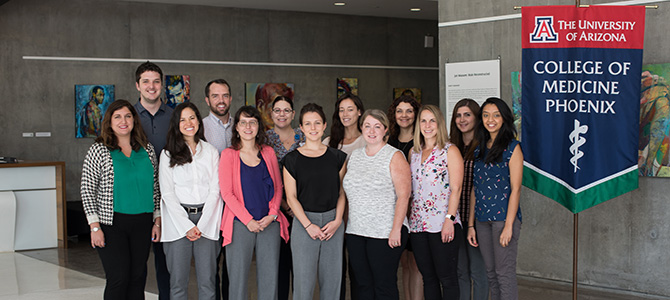
New Fellowship to Improve Clinical Teaching

The Department of Family, Community and Preventive Medicine at the University of Arizona College of Medicine – Phoenix is improving the effectiveness of clinical teaching by offering a program for new family medicine educators to network and collaborate.
The 2017–18 Primary Care Faculty Development Fellowship is under the direction of Jennifer Hartmark-Hill, MD, director of Capstones and Community Faculty Development at the College of Medicine – Phoenix.
The fellowship gives 15 faculty members and senior residents the opportunity to learn and apply a wide range of important academic concepts and skills.
“This fellowship provides professional development and education in academic leadership and management, team dynamics and communication approaches, optimal teaching and feedback strategies and educational theory not traditionally taught in medical school or resident physician training, among many other valuable tools,” Dr. Hartmark-Hill said.
Topics during the first session included information mastery, an aspect of evidence-based medicine, and point-of-care precepting, said Jeff Wolfrey, MD, department chair of Family, Community and Preventive Medicine at the college.
Natalie Galarza, MD, one of the program’s fellows, said she attended the session as a new faculty member and recent medical graduate with the hope of developing and enhancing her teaching skills, so she can better aid her residents in achieving their goals. Dr. Galarza is a clinical assistant professor at the college and a faculty member for the Family and Community Medicine Program at Yuma Regional Medical Center.
“It was very cordial and not intimidating at all,” Dr. Galarza said. “I also had an opportunity to learn and reaffirm some teaching skills.”
Faculty and students are able to use this program as a resource for their own potential participation in the future or for recruitment of future participants.
“This might be a model that other departments would want to consider. We think this program is an important support service for the various institutions and faculty members in the state that support the robust distributive educational model at the College of Medicine – Phoenix,” Dr. Wolfrey said.
Jacob Anderson, DO, a clinician educator for the UA College of Medicine – Phoenix Family Medicine Residency and assistant professor in the Department of Family, Community and Preventive Medicine, joined the fellowship program to gain a firmer understanding of how to best teach medical students and residents across a variety of settings and within the context of unique learning styles.
“The role of clinician educator is a challenging one that requires a skill set not intentionally taught in traditional medical education,” Dr. Anderson said. “I see the fellowship as a way to develop that skill set. The fellowship affords the unique and exciting opportunity to develop further as a teacher, mentor and leader in academic family medicine, while also engaging in a community of future and current teachers of family medicine from across the state.”
The Faculty Development Fellowship program has been sustaining a tradition of high-quality family medicine faculty enrichment for more than 30 years and continues to improve the effectiveness of clinical teaching within the University of Arizona’s medical community and the job satisfaction of the clinical faculty.
Story By: Alexis Berdine
About the College
Founded in 2007, the University of Arizona College of Medicine – Phoenix inspires and trains exemplary physicians, scientists and leaders to advance its core missions in education, research, clinical care and service to communities across Arizona. The college’s strength lies in our collaborations and partnerships with clinical affiliates, community organizations and industry sponsors. With our primary affiliate, Banner Health, we are recognized as the premier academic medical center in Phoenix. As an anchor institution of the Phoenix Bioscience Core, the college is home to signature research programs in neurosciences, cardiopulmonary diseases, immunology, informatics and metabolism. These focus areas uniquely position us to drive biomedical research and bolster economic development in the region.
As an urban institution with strong roots in rural and tribal health, the college has graduated more than 1,000 physicians and matriculates 130 students each year. Greater than 60% of matriculating students are from Arizona and many continue training at our GME sponsored residency programs, ultimately pursuing local academic and community-based opportunities. While our traditional four-year program continues to thrive, we will launch our recently approved accelerated three-year medical student curriculum with exclusive focus on primary care. This program is designed to further enhance workforce retention needs across Arizona.
The college has embarked on our strategic plan for 2025 to 2030. Learn more.